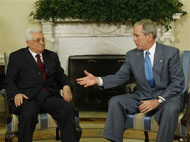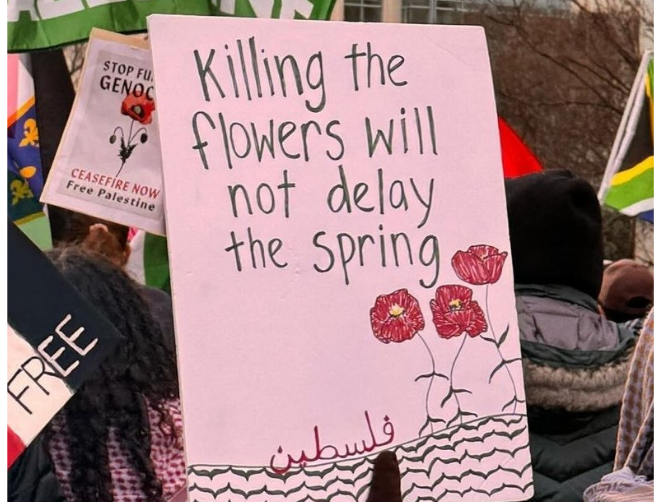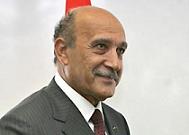When two parties partake in vigorous discussion in the hope of resolving contentious topics of dispute through compromise and cooperation, it is customary that the respective sides meet frequently to ensure that targets are being met within the timeframe, obligations are respected and that the collective aim of the process is understood in accordance with previous agreements.
It is almost five months since Israeli Prime Minister Ehud Olmert and Palestinian President Mahmoud Abbas journeyed to Annapolis and agreed to implement stage one of the 2003 road map – the US instigated initiative which predominantly calls on Israel to cease settlement expansion and alleviate movement and access restrictions in the West Bank. Meanwhile, the Palestinian Authority is charged with dismantling “terrorist” infrastructure in the West Bank. The parties involved agreed that the road map would be the platform from which to propel towards a final peace agreement before US President G. W. Bush officially leaves office in January 2009.
As it stands, settlements continue to be constructed in the West Bank with Israel declaring that they are built on permits distributed years prior to Annapolis and while the Palestinian Authority has established security forces deployed in hubs of military activity in the West Bank, Israeli occupation forces still control and preside over the areas in which the PA security forces operate.
The blatant failure to progress with stage one of the road map was emphasized by King Abdullah II of Jordan who stated that there needs to be a halt on Israel’s “settlement activities, a lifting of the blockade and restrictions on the movement of Palestinians”. By incessantly employing these measures, the Jordanian King asserted that Israel will “jeopardize negotiations”.
Under the current circumstances, one would expect the stipulations and advancements, or lack thereof, to be addressed. However, in this highly complex relationship which joins an occupier and an occupied as “peace partners” and despite the former reiterating its commitment to a peace agreement within the allotted timeframe, President Abbas visited Washington after traveling to Russia, Tunisia and Iceland intending to “focus my talks with President Bush…on negotiations and on ending with an agreement this year”. Having said this, Abbas has traveled alone and without his “partner”, so it is very unlikely that any developments can ensue without the presence of Israel – the party that needs to be convinced and persuaded.
Before landing at Andrews Air Force Base on April 22, President Abbas chose not to appeal to the US President about the communications breakdown but instead clarified Palestinian negotiator Saeb Erekat’s comments that he was not there to complain but to review Annapolis, declaring that “we don’t expect them to pressure Israel, but we want them to be fair”. Abbas’ presumption that the US will acquiesce to his plea is not substantiated when taking into account that President Bush will attend the 60th anniversary of the state of Israel appearing to forget Al Nakba which included the expulsion of 800,000 Palestinians from their homes - a catastrophe which was the byproduct of Israeli independence. While Abbas adopted this diplomatic stance, his Foreign Minister Riyad al-Malki contradicted his president and confirmed that the PA “wants a clear and forceful intervention by the Quartet so the two sides implement their obligations under the road map”.
The president though, meeting with US Secretary of State Condoleezza Rice, decided to stiffen his resolve and press the US on Israeli expansion of settlements warning that “the most important obstacle to the peace process and the negotiations is the continuation of settlement activities…I am calling on the Israeli government to stop all settlement activities so we can hold proper meetings to reach a solution on the core issues”.
The rather sudden shift in manner by Abbas could be explained by two factors. The first is the rising tensions at home concerning the real validity of peace with Israel and the gradual decline of Abbas' support while the second deals with the rarity of direct interaction between Abbas and Olmert. According to the Jerusalem Media and Communications Center [JMCC] which conducted a poll of 1199 Palestinians [760 in the West Bank and 439 in Gaza], President Abbas, while enjoying a 18.3% confidence rating at the inception of Annapolis in November has now dropped to 11.7%, mainly due to the lack of results from the peace summit. 41% of the census believes that the continuation of Annapolis makes no difference. Furthermore, an overwhelming 78.8% of Palestinians in the survey support a halt to peace talks if settlement expansion continues. Even if this is the case, 65.8% of the poll does not expect Abbas to actually deliver on any threat to abandon talks.
Additionally, President Abbas may use the US President as a medium with which to express his discontent with the lack of displays by the Israeli government to create conditions on the ground for a peace agreement. After all, with Israel in absentia from Washington, with the uncertainty surrounding its attendance at Sharm el-Sheikh on May 17 and the celebration of Israel’s independence next month, it is possible that President Bush will meet with Prime Minister Olmert before Abbas does. Concerning the prospective meeting at the Egyptian Red Sea resort, Abbas’ role in the process was typified when he admitted that “we would also gladly welcome Israeli Prime Minister Ehud Olmert at the summit…but we do not know whether this will be the case”.
Attempting to decipher Israeli opinions on a peace agreement compels one to venture into the field of ambiguity. Prime Minister Olmert said that “I don’t see any chance that we can implement an agreement in the coming period”. At the same time, it was revealed that a bill is going to be proposed which ostensibly deals with the settlement issue in the West Bank. The motion, advocated by vice premier Haim Ramon, reports that evacuating the 74 settlements east of the separation wall [70,000 people] would be supported by 50% of the settler population who would agree to monetary compensation at a total buyout cost of $2.5 billion. This assessment has no bearing on their road map obligations and if anything is yet another delay mechanism of little substance which detracts from their actual responsibilities in halting settlement expansion. In any event, the fact that the proposal is endorsed by some 50% is similarly irrelevant. Due to the expansive nature of settlements, their dismantling is regrettably an instance of all or nothing.
The Israeli agenda may claim to advocate a peace agreement by the end of the year but conversely states that no peace agreement can be implemented while Hamas is in control of Gaza. Hence, how can one force Israel to pursue peace seriously when they can constantly refer to the situation in Gaza, an area controlled by a group dedicated to destroying Israel? Israel has created its own veto power for any movement for peace.
Faced with such stagnation, the different methods of reaching a peace accord and having to juxtapose the numerous interests at play, what can the US do? As demonstrated on previous occasions, the US tends to project a message of commitment and optimism, appoint an individual to oversee/promote discussion and contemplate throwing more money at the problem.
While Abbas was in Washington, the US once again affirmed its commitment to the cause and its confidence that an agreement could be reached by the time President Bush leaves office. Furthermore, the US, which has already pledged $555million to the PA this year, announced that it would offer more money in order to boost the PA and President Abbas’ position. Lastly, the US has sent deputy assistant Secretary of State for Near Eastern Affairs Robert Danin to run Quartet envoy Tony Blair’s Middle East office. According to David Welch, Robert Danin “will lead the Blair mission’s effort on the ground to support the PA in improving the livelihood of its people in the West Bank and Gaza”. Danin will be the third high ranking official stationed in the region since Annapolis. On November 28, Commandant of the Marine Corps, Commander of the US European Command and Iraq Commission Chairman General James Jones was appointed as special envoy for Middle Eastern security to advise on the peace negotiations as well as the development of Palestinian security. Prominent Air Force Lieutenant General William Fraser III was also assigned in January 2008 to monitor road map commitments on both sides.
These established and highly decorated individuals, along with US security coordinator Lieutenant General Keith Dayton, have achieved next to nothing since they assumed their respective posts.
It is not their incompetence that has affected their ability to succeed but rather the complexity of the situation they are in and the US policy of disguising their real commitment to peace by fulfilling their minimal international expectations. By meeting regularly, maintaining optimistic rhetoric, stationing eminent individuals and pledging more money, the US can be seen as attempting to forge peace. However, in reality, the US has reaffirmed its true position in this process – their present strategy is sufficient enough and a lot easier than pressuring their Israeli allies.
Quartet envoy Tony Blair last week described the Palestine Investment Conference as “the litmus test of our sincerity”. The event, which is to be held in Bethlehem between May 21-23 aims to secure direct international investment to Palestine and revitalize the Palestinian economy. The former British Prime Minister proclaimed that “we will not dilute our commitment to Israel’s security” but will ensure that an “equal commitment to justice for the Palestinians” is sustained. “It is mandatory for success”.
The lack of pressure on Israel to abide by its responsibilities, the constant undermining of the PA and the inhumane blockade on the Gaza Strip prove that Israeli security and Palestinian justice are mutually exclusive. Instead, the present climate demonstrates how the maintenance of the former overwhelmingly supersedes the rights of the latter.












